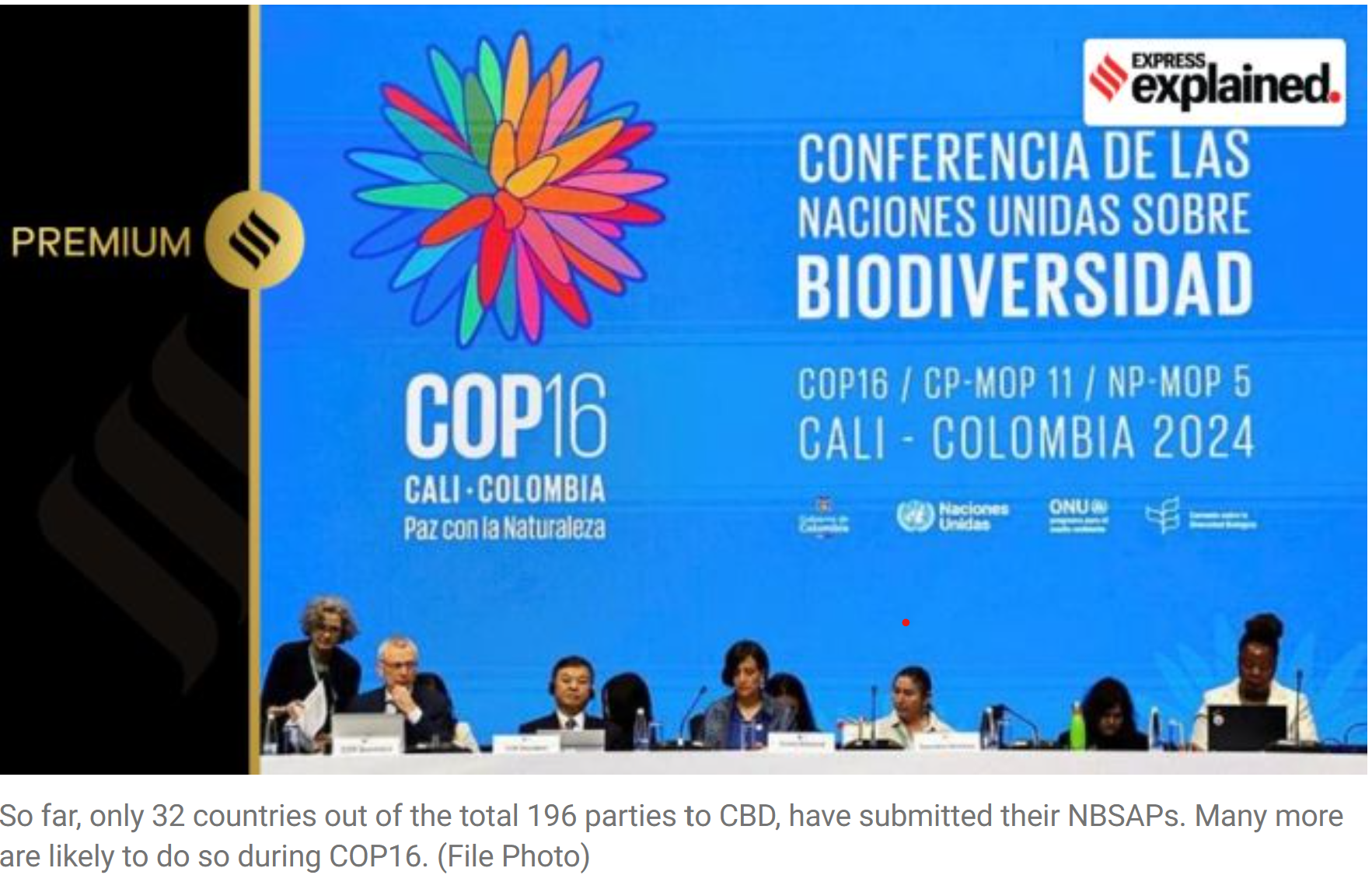COP16 to the Convention on Biological Diversity (CBD)

- 20 Oct 2024
In News:
The 16th Conference of the Parties (COP16) to the Convention on Biological Diversity (CBD) will take place in Cali, Colombia, from October 21, 2024. This marks the first gathering since the adoption of the Kunming-Montreal Global Biodiversity Framework (KMGBF) in 2022.
About Convention on Biological Diversity (CBD)
- Adopted in 1992, the CBD is the most comprehensive international treaty focused on biodiversity conservation, the sustainable use of natural resources, and the fair sharing of benefits derived from genetic resources. It has been ratified by 196 countries, making it a key global instrument for biodiversity governance.
Key Objectives of the CBD
- Conservation of Biodiversity: Protecting genetic, species, and ecosystem diversity.
- Sustainable Use of Resources: Ensuring resources are used in a way that does not deplete or degrade biodiversity.
- Fair Sharing of Benefits: Ensuring that benefits from genetic resources are shared equitably with countries of origin.
Notable Frameworks within CBD
- Nagoya Protocol (2010): Establishes a framework for the fair and equitable sharing of benefits from the utilization of genetic resources.
- Cartagena Protocol (2000): Regulates the transboundary movement of living modified organisms (LMOs) resulting from modern biotechnology.
The Kunming-Montreal Global Biodiversity Framework (KMGBF)
- Adoption: The KMGBF was adopted at COP15 in 2022, following the Kunming Declaration.
- Targets: The framework includes 23 targets for 2030 and 4 global goals for 2050, aimed at reversing biodiversity loss and promoting sustainability.
- Notably, the 30x30 Target aims for 30% of the world’s land and oceans to be conserved by 2030. This is a key agenda item at COP16.
- The framework also emphasizes equitable access to genetic resources and the sharing of benefits from their use (Target 13).
Challenges and Issues at COP16
- Benefit-Sharing from Digital Sequence Information (DSI):
- A key issue is the fair sharing of benefits from digital sequence information (DSI) on genetic resources. The adoption of a global mechanism for this issue is still pending, as negotiations between developed and developing countries remain unresolved.
- Developed nations advocate for unrestricted access to genetic materials in exchange for voluntary contributions to a global fund.
- Developing nations seek a more equitable system, aligned with the CBD's principles of fair benefit-sharing.
- A key issue is the fair sharing of benefits from digital sequence information (DSI) on genetic resources. The adoption of a global mechanism for this issue is still pending, as negotiations between developed and developing countries remain unresolved.
- 30x30 Target Progress:
- The 30x30 target, which aims to conserve 30% of land and oceans by 2030, is far from being met:
- 17.5% of land and 8.4% of oceans are currently under protection.
- Concerns persist about the effectiveness of these protected areas, as studies suggest they may not be sufficient for long-term biodiversity conservation.
- The 30x30 target, which aims to conserve 30% of land and oceans by 2030, is far from being met:
- Financial Commitments (Target 19):
- Developed countries have pledged $20 billion annually for biodiversity financing by 2025. However, progress is slow:
- By September 2024, only $8.2 billion (41% of the target) had been committed.
- COP16 will assess whether this target can be met, with further announcements expected.
- Developed countries have pledged $20 billion annually for biodiversity financing by 2025. However, progress is slow:
- Implementation Gaps:
- Countries are required to set national targets aligned with the KMGBF. As of COP16, only 100 parties have submitted their targets, and 30 countries have updated their National Biodiversity Strategies and Action Plans (NBSAPs).
- A significant implementation gap remains in translating these targets into concrete actions.
Focus Areas for COP16
- Strengthening the 30x30 Target:
- COP16 will push for enhanced efforts to meet the 30x30 conservation goal. There is a need for better management and monitoring of protected areas to ensure they contribute to biodiversity preservation.
- Finalizing Benefit-Sharing Mechanism:
- Countries will focus on finalizing the multilateral benefit-sharing mechanism for genetic resources and DSI. The goal is to ensure that countries benefiting from genetic resources share those benefits with the countries of origin, addressing the issue of biopiracy and ensuring equitable access.
- Financial Commitment and Tracking:
- The financial shortfall for biodiversity conservation will be a critical discussion point. Effective monitoring of the biodiversity finance tracker will be needed to ensure that developed countries meet their $20 billion/year commitment.
- Addressing Implementation Gaps:
- There is a need to enhance monitoring and reporting mechanisms, improve national strategies, and align financial support with on-ground conservation efforts.
